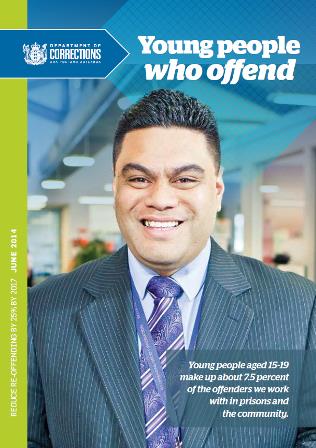Young People Who Offend brochure
Young People Who Offend is one of nine brochures we have produced that help tell our story. Printed copies are available from our probation sites and prison visits centres.
Download the Young People Who Offend (PDF 925.5MB)
 Our aim is to unlock young offenders’ potential and ensure they leave us educated or employed with a strong sense of identity so they can make a positive contribution to society.
Our aim is to unlock young offenders’ potential and ensure they leave us educated or employed with a strong sense of identity so they can make a positive contribution to society.
We work closely with families/whänau and with agencies such as Child, Youth and Family, health providers, Courts and community organisations, to provide young people with the care and guidance they need.
Corrections takes particular steps to protect young people in custody (eg, keeping them separate from older prisoners, and targeting interventions to effectively address risk in a developmentally appropriate way). Particularly vulnerable 14-16 year olds may be placed with Child, Youth and Family to serve all or part of their sentence.
What works with young people who offend
About half of all youth offending is minor and most young people who offend do so only once or twice.
About 20 percent of these young people commit serious/repeat offences. This group needs the most attention if we are to make our communities safer.
Early intervention is important to improve outcomes for young people who come into our care. Corrections is focusing on three key areas:
- thinking and decision-making
- drug and alcohol issues
- opportunities for education, training and employment.
In the community, we aim to engage with young offenders regularly and use practical strategies to reward compliance and discourage non-compliance.
It’s important for us to engage with the young person’s support people and keep them connected with positive influences in their life.
Getting with the programme
Youth Units are separate environments in prison for young people under the age of 18, and some 18 and 19 year olds who have been assessed as vulnerable.
These units have higher staff/offender ratios and we are working towards providing a structured day with lots of activity including rehabilitation programmes, job-related training, and education.
In these units, young people can take part in an intensive rehabilitation programme that helps them to acknowledge and address their offending, plan for the future to avoid further offending, learn how to cope with uncomfortable feelings and to practise pro-social skills to help their interactions with others.
Young people are also given priority for psychological services.
Rehabilitating young people poses some unique challenges. Young people on programmes often need more support than older offenders to stay motivated.
Experience tells us that to be effective, programmes must help participants deal with the issues behind their offending. Programmes also need to show theyoung person that there are alternatives to further offending behaviour.
Education and employment
Spending time in prison can open up a new world of opportunities for those young people who may have missed out on schooling or never had a job.
Young people placed in the Youth Unit have their educational needs assessed and those with literacy needs get special tuition. We encourage all young offenders to take advantage of
educational and employment opportunities available to them, including working towards national certificates and qualifications, work skills and trade training.
Safe keeping
Being young and in prison carries added risk so we take additional steps to assess each young person’s risk of self harm or suicide, or risk of victimisation in the mainstream population. Staff are trained to monitor any risk and to work with the young person and relevant agencies to keep them safe.
Our wider commitment
- Part of our effort to reduce re-offending means helping to break the cycle of re-offending.
- Our work with young people who have offended can involve working with their parents, partners and children as well as other agencies that might be in contact with them.
- When our staff encounter children and young people at risk of harm, or harming others, we will take action to prevent harm – either by direct intervention or by sharing information with appropriate authorities.
- While only a small proportion of the country’s young people end up in our care, we are committed to doing our part to safeguard them all.

